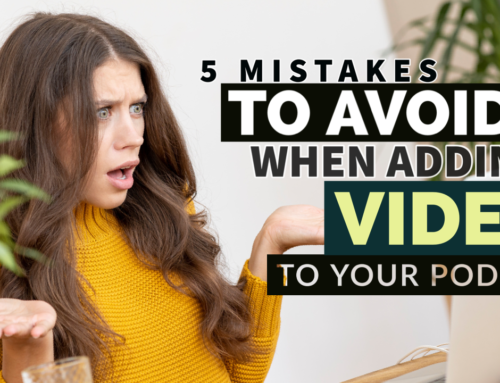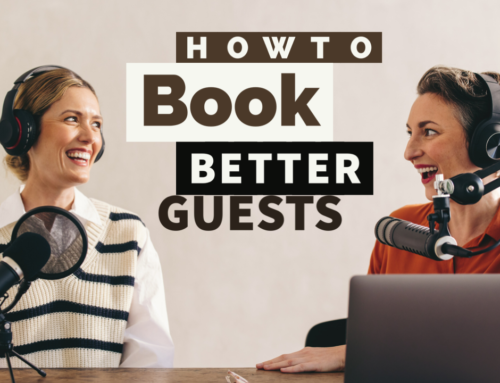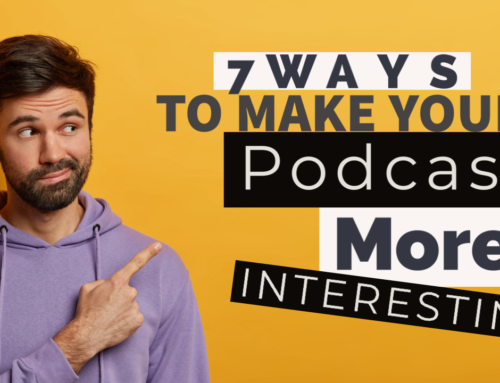Podcasting: Best Practices
Ready to start your podcast or looking for ways to improve your already awesome show?
The Post Production Shop is here to help!
Podcasting is a great way to promote your business, share news and information, or simply build a community. But before you jump on the mic and do your thing, it’s best to have a good understanding of some of the basics.
If you make it a point to remind yourself of these best practices from time to time, your podcast is sure to grow.
Some episodes will be better than others, there will always be ebbs and flows. However, your long-term success is tied to your ability to consistently and reliability provide value to your listeners. After all, that’s why they listen in the first place! So as in many areas of life, podcasting success is built on mastery of the fundamentals.
So, what are the best practices for podcasting?
Well, it’s all about P-E-O-P-L-E
Let’s get into it.

Prepare yourself and your guest
Sketch out notes or an outline of what you want to say before you start recording.
Whatever you do, don’t just hit record and say, “Um… what are we talking about today?” This will help you stay on track and ensure that you touch on all the main points. Unless you land some impromptu interview with a celebrity and it’s now or never, there’s no reason to not be prepared for each episode. This might also mean recording a few episodes in advance to keep in the ‘bank’ as well.
Go into the recording with a general idea of how long the episode will be.
Setting this expectation in advance will help you to manage time as you glance at the clock throughout the recording. Most importantly, BE FLEXIBLE! Sometimes you’ll go shorter or longer than you expected, and this is completely fine. The idea is to provide consistent value throughout each episode, not necessarily to make each episode exactly the same length. With a revolving door of different guests on, each episode will develop differently anyways. So prepare enough so that you feel confident as you hit Record. Then you will be more relaxed, and your show will sound and feel more natural.
Make sure guests are prepared.
When you are scheduling with people to have them guest on your podcast, a gracious host will share questions with them in advance. If not every last question, at least a rough outline. Sometimes the context might be such that posing a question that your guest is not prepared for is appropriate. Though as a rule, helping them to be prepared is a good idea.
Pro Tip: Don’t over-prepare either!
Unless the concept of your show is to read out a pre-written monologue (which works for some shows), don’t rely too heavily on scripts, or focus too much on reciting pre-written questions completely verbatim. This may sound unnatural and might be distracting to your listeners.
Execute the technical aspects well
Get a good grasp of the basics of recording.
Be sure that the input level of your microphone is at a good level. Too low and your final result might be very noisy. But not too high so that you’re clipping either! You will typically have two places where you need to watch your input level:
1. Your recording interface, the device where you plug your microphone into
2. Your DAW, the software you are using to capture the recording
The input level for both should be well into the green when you speak at your loudest, but not quite reaching the yellow.
Make sure you’re using a good microphone and that it is positioned correctly.
This means not too far or too close, usually 4-6 inches from your face, so that it picks up all of your voice. Double check there aren’t any objects between you and the microphone, as this can create an echo effect that is difficult to remove in post.
Use pop filters or windscreens to reduce background noise while recording.
A pop filter or windscreen is a net designed to catch pops and sibilance in your voice while recording. These will help keep any plosives (hard consonants, typically the P-sound) from being too loud, which can distort recording equipment and earphones. This will also keep unwanted sounds and noise around you from being picked up on the recording also.
Double check you have unnecessary fans turned off, windows closed, phone on silent, etc. in order to not have irritating background noise interfering with your show. Be careful not to needlessly fidget with noisy objects while recording either, as this will pick up through your microphone.
And for any accidental noise that does make it onto the recording despite your best efforts, we will do our best to edit it out of the final version.

Opine skillfully and avoid empty filler words
To opine is to state one’s opinion
Hey, we were really determined to keep the acronym going! But this is what podcasting is all about. But if you were to break it down, you would be shocked to realize how much dialogue on any given recording is actually not opining. Rather it’s just those dreaded filler words and other verbal gobbledygook that add next to nothing to your show.
Break the habit and stop depending on filler words.
Some examples of common filler words are “like… um… you know…” – and people use these for various reasons. Often because they’re nervous or letting the other person know they’re thinking about what was just said. Most often though, using filler words just becomes a tough habit to break. This is especially true in conversations where the other person is using lots of filler words.
“Like… um… you know… “
While filler words aren’t necessarily undesirable in all conversations and contexts, they can distract listeners from what you’re saying and make your podcast sound unprofessional. This becomes especially problematic if you use so many filler words in one sentence or train of thought that you become difficult to follow. Avoiding filler words – or at least keeping them to a minimum – can make your podcast instantly sound more polished and professional.
Give yourself time to think about what you’re saying next
If you find yourself using filler words a lot, try pausing for a moment before speaking again. This way you can give yourself time to think about what comes next and then say it with confidence. Again, some filler words are natural and completely ok, but there are levels here.
Pro Tip: Audio editing can remove up to 100% of filler words, which even the most seasoned veterans still let slip. There are some automated services available, such as Descript, that remove filler words. And while they do a great job at getting every last “um… you know…” – beware of relying too heavily on these apps. If you do, there are 2 main issues you will encounter:1. They often remove words that aren’t filler words and are actually necessary for context.
2. The edits are extremely choppy, and your final show will sound like it was over-edited.
If you want to say goodbye to filler words forever, with the quality assurance that comes with having a real human edit your podcast, contact us today.

Pause and take a breath
Keeping up a podcast long-term is very difficult, especially when you have other life commitments that get in the way.
Schedule your time.
Put activities like guest research and episode prep on your schedule. Put your recording time on your schedule. Even put post-recording activities need to be on your schedule, such as writing show notes, transcribing, or any editing you do yourself. But perhaps most importantly, schedule your downtime!
Whether or not your podcast is your full-time job (and indeed whether or not you’ve even started making any money at all yet), it’s still a time-consuming and energy-demanding activity.
Take breaks.
If you intend to keep this up long-term, you will need breaks from time to time. Rest is important in all areas of life, but especially with regard to podcasting because of the nature of the medium. Your performance and enthusiasm (or lack thereof) are essential to the end result.
If you’re tired, burned out, uninterested, just recording out of a sense of duty week after week, although your heart’s no longer in it – your audience will pick up on this and they may stop listening. So, this isn’t just a matter of preference, it is important to your success as a podcaster. This is where having an episode bank becomes so crucial, that you can give yourself a week off from time to time when needed. Better yet, you can schedule yourself a week or two off in advance.
Use flashback episodes
Don’t forget, once you’ve been around long enough, you can always use or revamp older episodes. This is where you replay some of your favorite content. It isn’t something that should be done all the time, but it’s another tool in your box that you can use to make sure you are pausing and getting enough rest. Also, to help ensure that every time you go to record a new episode, you will be at your absolute best.
Learn as much as you can.
As in every area of life, success as a podcaster is correlated to ongoing education. Continual learning is a fundamental practice of becoming a solid host and content producer. It will naturally enable you to keep your show interesting week after week, year after year.
With the countless forms of online learning resources, education on literally any subject one can imagine has never been easier to find. Here are the 2 primary areas of continual learning, which you would do well to focus on:
1. The craft of podcasting
Follow blogs and podcasts designed specifically for podcasters and content creators. They will help to energize you and encourage you to think of new ideas, and will also help you stay up to snuff on your technical skills. These can also be reliable sources for keeping up on industry trends, like new apps or tools that could be useful to you, as well as topics and guests.
2. Your specific subject area.
It’s highly likely that you don’t even need to be reminded of this, but you can nearly always stand to learn something new in your domain. There’s always that book on your shelf that you haven’t finished yet or that podcast episode you’ve been meaning to listen to. This process usually develops naturally throughout the life of your podcast, where you learn things from interesting guests who recommend you other guests and resources, and on it goes. But definitely don’t skip this step. Keep reading, listening, and learning as a lifelong pursuit, and you and your podcast will be better for it.
Enjoy what you do
Don’t try too hard or take yourself too seriously!
No one wants to listen to a rigid or uptight podcast host. So don’t let that be you!
If you misspeak, stutter briefly, or get a quote wrong – don’t worry about it. Honestly, it’s not that big of a deal. If you can correct yourself quickly without being awkward, then sure, go right ahead. But know that the more you podcast, the more likely you’re going to get something wrong or say something silly at some point. It’s inevitable and completely fine. And the ironic part? Most people won’t even notice and of the ones that do, most of them won’t even care.

DON’T TRY TOO HARD!
This is worth repeating because some hosts (and people in general) really struggle with this anxiety, which can be amplified when recording. And it can certainly come across to your audience if you’re trying too hard to avoid these types of minor errors. Let the conversation flow naturally. Implement these suggestions and you will be most confident going into your recording session, and of course, get some professional editing done too.
But at the end of the day, this best practice will only be possible if you’re already nailing it on all the others. P-E-O-P-L builds the foundation and -E is the culmination. The knowledge that you have all of the fundamentals down will give you a confidence and sense of enjoyment while recording your podcast that you wouldn’t attain otherwise. And this enjoyment will also be a reward in itself to you, for doing what you do.
Pro Tip: Don’t sweat the little stuff, it’s fine. You’ve got this! Podcasting is supposed to be an enjoyable, educational experience, so don’t settle for anything less.
Well, there you have it, the key to podcasting success is P-E-O-P-L-E.
Prepare yourself and your guest. Execute the technical aspects well. Opine skillfully and avoid empty filler words. Pause and take a breath. Learn as much as you can. Enjoy what you do.
Happy podcasting!



